Securing the Future: IP’s Role in Automotive Innovations within the Metaverse
The concept of the Metaverse, a computer-generated virtual space, is transforming how we interact with digital environments and each other. Central to this transformation are virtual reality (VR) and augmented reality (AR) technologies. These automotive innovations enable millions of individuals to engage with digital objects and avatars, facilitating a range of activities from socializing to working. As the Metaverse continues to expand, it is reshaping various industries, including gaming, education, entertainment, real estate, retail, and notably, the automotive industry.
This article explores the profound impact of the Metaverse on the advanced automotive sector, highlighting its applications, the innovative technology behind it, its intellectual property (IP) implications, and its potential future.
Table of Contents
The Metaverse: A New Digital Frontier
The Metaverse unveils a vast digital universe where VR and AR technologies usher users into a three-dimensional realm. Moreover, beyond mere entertainment, it reshapes social interactions, education, and commerce, offering boundless possibilities. Industries are undergoing profound transformations, with advanced automotive practices leading the charge:
- Gaming: Providing immersive and interactive experiences.
- Education: Enabling virtual classrooms and hands-on training.
- Entertainment: Offering new forms of media consumption and social interaction.
- Real Estate: Allowing virtual property tours and remote transactions.
- Retail: Enhancing online shopping with virtual try-ons and interactive stores.
- Automobiles: Pioneering advanced automotive solutions, transforming car design, manufacturing, and purchasing processes.
In the Metaverse, users create digital identities through customizable avatars. These avatars allow users to express their personalities and interests, making interactions more personalized and engaging. This digital identity plays a crucial role in how users navigate and interact within the virtual environment. Moreover, in the realm of advanced automotive endeavors, it promises to redefine conventions, from innovative vehicle designs to unparalleled customer engagement.
Transforming the Automotive Landscape
In the automotive sector, the Metaverse is experiencing a profound metamorphosis with the integration of Metaverse technologies. It serves not merely as an extension of digital engagement but as a revolutionary tool redefining core industry processes and consumer experiences. These innovations are fundamentally reshaping advanced automotive practices, spanning car design, manufacturing, purchasing, and even driving experiences. With these groundbreaking advancements, safeguarding intellectual property emerges as a pivotal necessity to sustain competitive advantage and drive further innovation.
Metaverse’s Role in Automotive Landscape
The Metaverse is not just a digital realm; it’s a gateway to a new era of advanced automotive innovation. In this virtual space, users can visit virtual vehicle retail stores, where they can sit inside virtual car models, view them from every angle, and even take virtual test drives. This immersive experience allows potential buyers to explore vehicles in detail without leaving their homes.
1. Virtual Test Drives: The Future of Car Buying
Traditional test drives are undergoing a paradigm shift within the Metaverse. Prospective buyers now have the chance to experience the thrill of driving without ever leaving their homes. Collaborations between advanced automotive companies like MG Motor and Metadome have birthed the ‘MGverse,’ a platform where virtual test drives are not just feasible but astonishingly lifelike. Taking this concept further, Maruti Suzuki’s ‘Nexaverse’ introduces a virtual showroom where avatars can freely roam, interact with various advanced automotive models, and customize them in real-time.
2. Redefining Vehicle Testing: Safe and Efficient
The Metaverse also plays a critical role in autonomous driving. Companies like Waabi create virtual environments and testing of autonomous vehicles. By creating detailed virtual environments, companies can simulate countless driving scenarios, including emergency responses, without the risks associated with physical testing. This approach is not only safer but also more cost-effective, accelerating the development of autonomous driving technologies.
3. Revolutionizing Operations and Maintenance
Advanced automotive diagnostics and repairs undergo a notable transformation through the integration of Metaverse technologies. Manufacturers now possess the ability to remotely guide technicians through intricate repair processes, extending the reach of service networks. For instance, technicians equipped with AR glasses connected to a Metaverse platform can receive step-by-step guidance from specialists, ensuring precise and high-quality repairs.
4. Strengthening Customer Relations
The Metaverse is enhancing the interaction between manufacturers and customers throughout the vehicle’s lifecycle. This ongoing engagement facilitated by Metaverse technologies ensures improved customer support and satisfaction, fostering a stronger bond between the brand and its clientele.
The Metaverse serves as a catalyst for innovation within the advanced automotive sector. Its immersive experiences, coupled with its potential for enhancing safety, efficiency, and customer satisfaction, herald a new era of possibilities for the automotive industry.
Intellectual Property Insights: The Fuel Powering Automotive Innovation in the Metaverse
The rapid development of Metaverse technologies in the automotive sector is reflected in the surge of patent filings. Furthermore, companies are actively protecting their automotive innovations to stay competitive in this emerging field.
The Surge of Patent Filings: A Testament to Technological Commitment
The landscape of automotive innovations is witnessing a remarkable surge in patent filings related to the Metaverse. From 2015 to 2023, there has been a significant uptick in applications, signaling a robust interest and investment in Metaverse technologies. This trend underscores the automotive industry’s dedication to harnessing these technologies to revolutionize vehicle design, manufacturing, and the overall user experience.
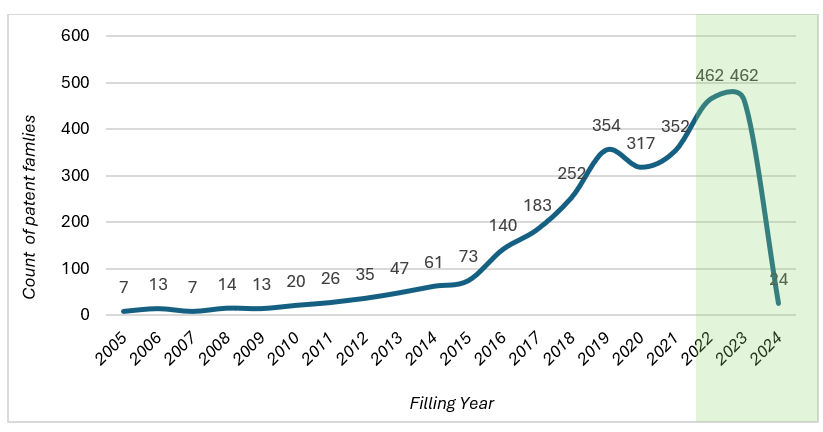
Leading the Charge: Major Patent Holders in Advanced Automotive
The top leading patent holder company such as HYUNDAI MOTORS is very active in the domain of Metaverse in the Automotive sector. The maximum number of patent families belong to Hyundai Motors. Toyota Motor, BMW- Bayerische Motoren Werke, Volkswagen, and AUDI are also filing in the Metaverse in the Automotive domain. Companies like FORD GLOBAL TECHNOLOGIES, CHONGQING CHANGAN AUTOMOBILE, LG ELECTRONICS, CHINA FIRST AUTOMOBILE WORKS (FAW), and ROBERT BOSCH are also active in this domain.
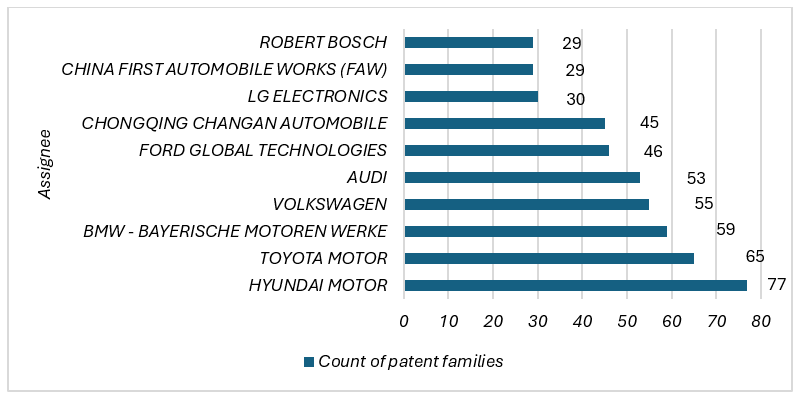
Top Inventors in Advanced Automotive
Prominent Innovators like Zhang Wei, Chen Tao, and Wei Lang have made substantial contributions to advancing Metaverse applications in the automotive industry, covering a wide range of applications from VR systems for car design to AR solutions for in-car entertainment and safety.
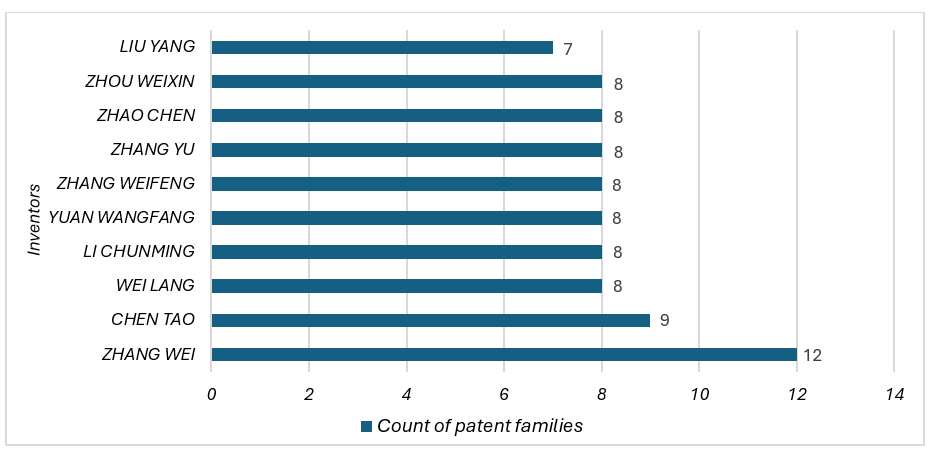
A Global Race: Geographic Distribution of Innovation
From a geographical standpoint, China and the United States lead in patent filings for Metaverse technologies in the automotive domain. Furthermore, this distribution highlights the global interest and strategic importance of Metaverse innovations in the automotive industry, reflecting the fierce competition among top automotive companies to secure intellectual property rights in this field.
Earliest Filing Trend of Assignees (2020-2024)
Analyzing the filing trends from 2020 to 2024 reveals specific patterns among top companies. Moreover, Hyundai Motors, often in collaboration with Kia Motors, has filed the most patents in the Metaverse automotive sector. These companies have jointly or independently filed the maximum number of 77 patents in the field of Metaverse in the automotive sector. Notably, China First Automobile Works (FAW) exhibited a surge in patent filings in 2023, followed by Chongqing Changan Automobile. This trend highlights the importance of automotive innovations in the Metaverse.
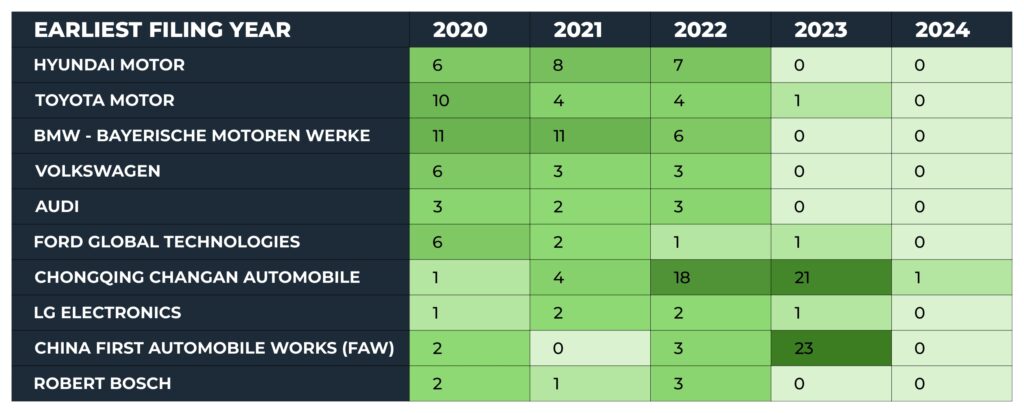
Major Assignees and Country of Origin
The international patent filing strategies of different companies reflect their ambitions to establish a foothold in key markets. Hyundai Motors dominates Korean filings, while Toyota Motors has secured a significant number of patents in the United States. In Germany, BMW, Volkswagen, and Audi lead the filing activities, showcasing the country’s strong IP presence in the automotive innovations sector.
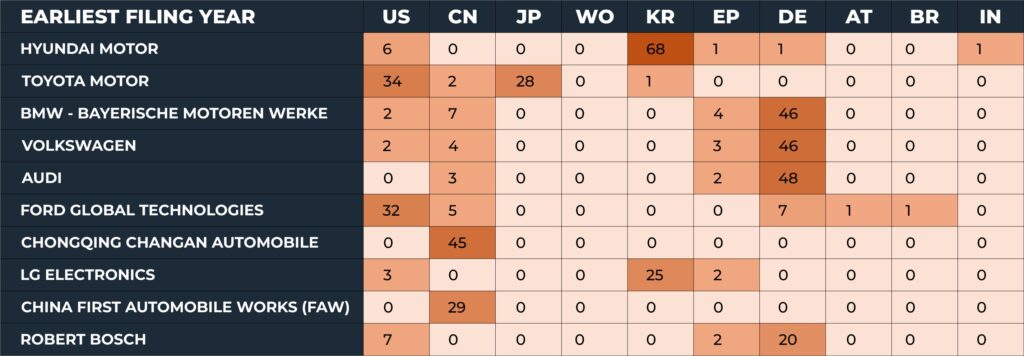
Top International Patent Classification (IPC) in Metaverse in the Automotive Sector
The chart below depicts the distribution of Metaverse in the automotive domain patents, IPC Classification-wise. Approximately 263 patents have cited the main IPC class G06F-003/01, and around 161 have cited the main IPC class G06T-019/00. The number of patents in each class is higher compared to the total number of patents in the portfolio, as one patent reference may cite more than one IPC main or sub-class. This classification underscores the diversity of automotive innovations in the Metaverse.
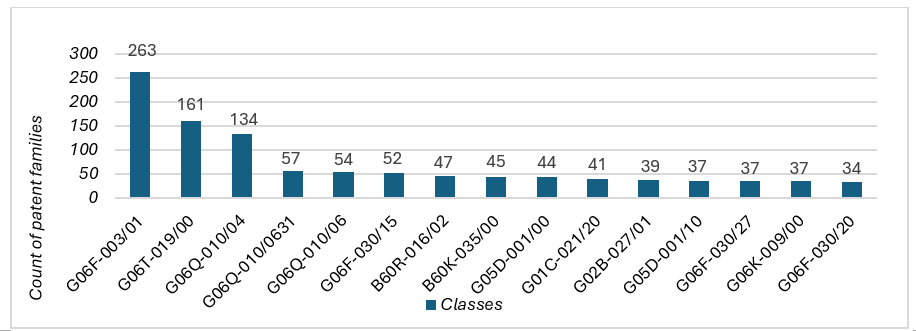
The Legal Landscape: Status of Patent Families
The legal status of patent families in the Metaverse automotive sector is a critical indicator of the market’s maturity and the value placed on these automotive innovations. Approximately 42% of the patents have been granted, showcasing the industry’s success in securing IP rights. Toyota Motors stands out with 48 granted patent families, while Hyundai Motors follows closely with 42 granted patent families.
On the other hand, the pending applications, which account for about 40%, reflect the ongoing efforts and potential for future growth in the sector. BMW holds a significant number of 44 pending patent families, indicating its active pursuit of automotive innovation. Similarly, Chongqing Changan Automobile has 39 pending patent families, demonstrating its commitment to expanding its technological footprint in the Metaverse.
This mix of granted and pending patents is a testament to the dynamic nature of IP in the automotive Metaverse, with companies continuously striving to protect their automotive innovations and capitalize on the opportunities presented by this virtual revolution.
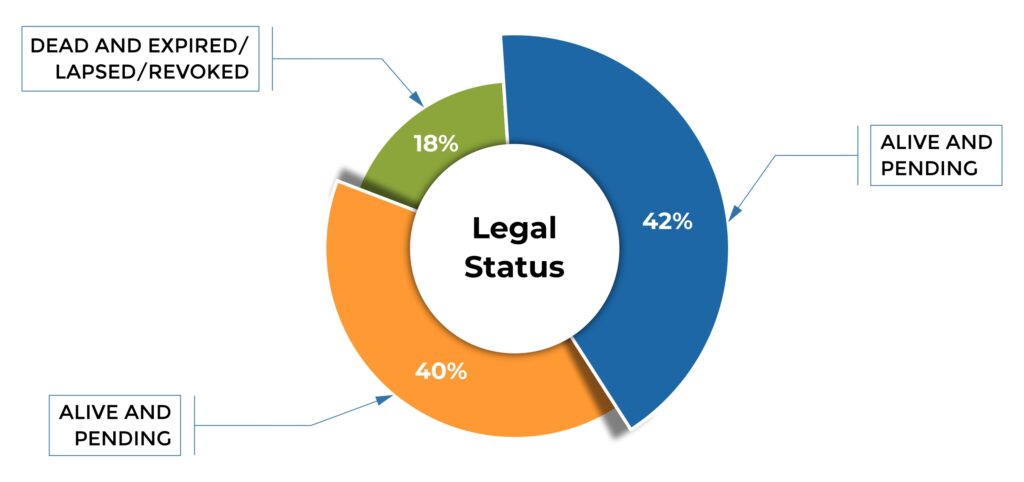
Technology Focus Areas
The focus areas of patent filings indicate the key technological trends in the Metaverse for the automotive industry. Around 39% of patents focus on controlling characters or objects in Metaverse environments, highlighting the importance of creating interactive and immersive user experiences. Another major area of focus is modifying content based on user movement, with 24% of patents in this category, showcasing the significance of user interaction in these virtual spaces.
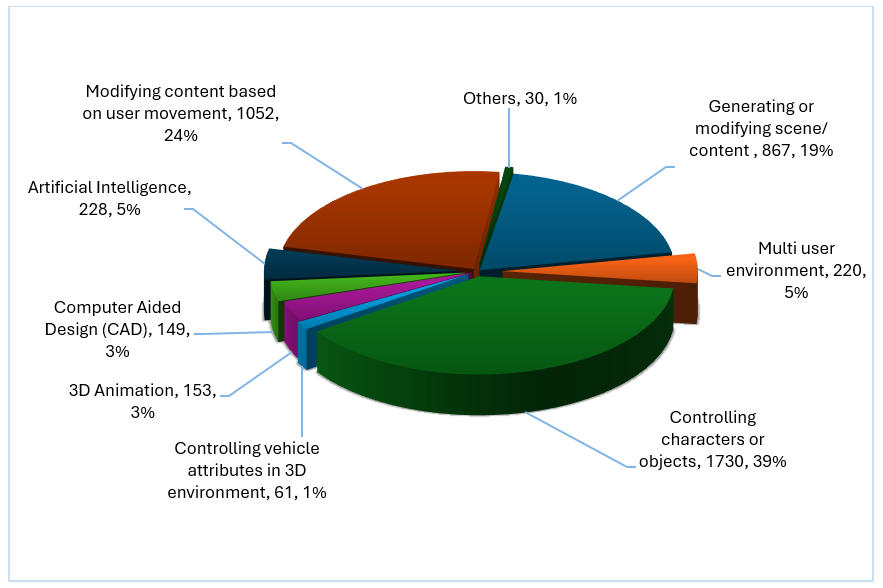
Emerging Startups in the Metaverse
Several startups are at the forefront of integrating Metaverse technologies into the automotive industry, offering innovative solutions that enhance user experiences and safety. Protecting their IP is crucial for these startups to secure their automotive innovations and attract investment.
1. Metadome.ai
An Indian startup specializing in immersive 3D and XR technologies, Metadome.ai provides cloud-based solutions for brands to create engaging customer experiences. Their platform, XUV400verse, developed for Mahindra & Mahindra, offers virtual showrooms, customizable avatars, and virtual test drives. Metadome.ai’s solutions are designed to enhance customer engagement and satisfaction by providing realistic and interactive virtual environments where users can explore and customize vehicles in detail.
2. YAAK
A German startup, YAAK, offers VR simulation tools for driving schools. Their platform uses AI and 360-degree cameras to simulate real routes, enhancing the quality of driving training. YAAK’s innovative approach allows driving schools to provide more effective and comprehensive training to students, improving their driving skills and safety on the road. The use of VR simulations enables learners to practice complex driving scenarios in a safe and controlled environment, building their confidence and competence behind the wheel. This is a prime example of automotive innovations.
3. HMDrive
An Italian startup, HMDrive, utilizes AR technology to enhance drivers’ perception on the road. Their AR glasses project holograms that improve safety and provide a unique driving experience, particularly beneficial for sports and industrial vehicle drivers. HMDrive’s technology integrates data from vehicle sensors and AR glasses to create a seamless and immersive driving experience. In industrial environments, this technology can enhance productivity and safety by providing real-time information and guidance to drivers. For sports car drivers, HMDrive offers an exciting AR experience that allows them to follow the trajectory of a “Ghost Car” controlled by a professional driver, improving their driving skills and performance.
The Global Metaverse Market for Automobiles
The integration of Metaverse technologies into the automotive industry is creating new market opportunities. Automakers and retailers are using these technologies to present their products in virtual spaces, closing the gap between customers and retailers.
- Enhancing Customer Engagement: Metaverse applications allow users to explore, customize, and test-drive vehicles virtually. This immersive experience enhances customer engagement and satisfaction, making the car-buying process more interactive and enjoyable. By offering virtual showrooms and test drives, automakers can reach a wider audience and provide a more personalized and engaging experience for potential buyers. This approach not only improves customer satisfaction but also increases the likelihood of sales conversions.
- Streamlining Operations: The Metaverse streamlines various operations within the automotive industry, from design and manufacturing to sales and after-sales services. This integration leads to faster innovation, improved efficiency, and cost savings. For example, virtual prototyping and testing can significantly reduce the time and cost associated with developing new vehicle models. Similarly, virtual training and support can enhance the efficiency and effectiveness of service networks, ensuring high-quality repairs and maintenance for customers.
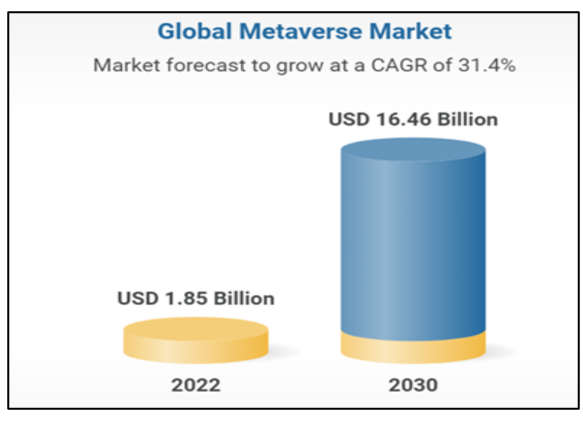
Conclusion
The incorporation of the metaverse into the advanced automotive industry is poised to revolutionize how we interact with vehicles. From immersive design and manufacturing processes to enhanced customer experiences and advanced autonomous driving testing, the Metaverse offers a future filled with automotive innovation. As this technology continues to evolve, we can expect further advancements that will transform the entire advanced automotive industry, making it more interactive, efficient, and engaging for consumers worldwide.
The journey into the Metaverse promises an unforeseen future with immersive experiences, faster operations, improved safety, and rapid innovation. As the Metaverse matures, its impact on the advanced automotive industry will only grow, heralding a new era of technological advancement and user engagement. Protecting intellectual property in this dynamic landscape is paramount to ensuring continued innovation, competitive advantage, and sustainable growth for all stakeholders involved.
As the Metaverse expands as predicted, it is likely to evolve in unforeseen ways. However, this underscores the importance of anticipating future automotive innovations and being prepared to adapt to changes. This is where Sagacious IP’s technology scouting service becomes invaluable. With our team of expert IP professionals, we can assist you in identifying optimal solutions to your technical challenges and fortifying your patent portfolio.
– By: Anu Khandelwal (ICT Searching) and the Editorial Team
Having Queries? Contact Us Now!
"*" indicates required fields




